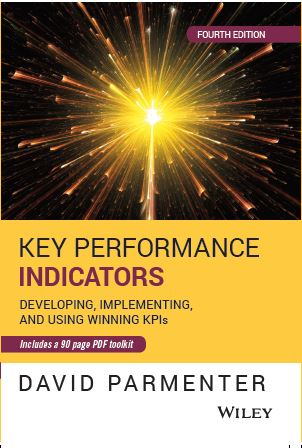Your cart is currently empty!
Search results for: “davidparmenter.com”

David Parmenter
posted on
Key Performance Indicators – developing, implementing and using winning KPIs (4th Edition)
Quick links related to David’s KPI work book cover book exhibits as e-templates Look inside- at the contents pages KPI implementation guide <100FTE (whitepaper 180 pages+ E-Templates + KPI database ) Look inside – at the index KPI implementation guide 100 -250 FTE (whitepaper 180 pages+ E-Templates +KPI database ) Buy this Book @ amazon.com KPI implementation…

David Parmenter
posted on
The Financial Controller and CFO’s Toolkit
Quick links related to this book The book cover Download the chapter on leading and selling change. Buy from Amazon A look inside the book Testimonials on The Financial Controllers and CFO’s Toolkit 3rd edition Download the chapter on recruiting. Download the chapter on rapid month-end reporting Download the chapter 16 on quarterly rolling forecasting A sample…

David Parmenter
posted on
The Leading-Edge Manager’s Guide to Success
Quick links related to this book Book Cover Get this book @ Amazon Look inside the book Treasure map checklist A sample E-template Chapter 6: Develop winning working habits Comparing Competing Job Offers Checklist A sample E-template Chapter 5 Creating Winning Personal Habits Finding a Mentor Checklist A sample E-template Chapter 2 Find…
David Parmenter
posted on
Nine KPI reporting templates
In my KPI book, I have setout a number of examples of reporting templates. See an extract of my Chapter 10 Reporting Performance Indicators 4th edition To get my latest work and access to the electronic templates Buy my implementation guides and accompanying electronic media to get you started. How to implement winning KPIs (180 page Whitepaper + electronic…
David Parmenter
posted on
4 Steps to Creating a Board Dashboard
By David Parmenter The four steps Finding the reporting measures to report to the Board There is a major conflict in most organisations that have boards, as to what information is appropriate for the Board. Since the Board’s role is clearly one of governance and not of management it is, I believe, totally inappropriate to…
David Parmenter
posted on
Ten guidelines for designing KPI graphs
The ten guidelines for designing KPI graphs There is a major problem with reporting. The writers often do not understand enough about the science of reporting. In addition, too many reports have been prepared monthly, which is far too late for prompt action. The reporting framework used in an organization must accommodate the requirements of the different levels in the organization…
David Parmenter
posted on
The 11 rules for designing meaningful measures
There are a number of rules to follow when designing measures. Source: Extracted from Key Performance Indicators – developing, implementing and using winning KPIs (4th Edition) 1. Understand the difference between Result and Performance Indicators If you can phone a manager and they accept the responsibility for a measure, it is a Performance Indicator. Where you have measures that…
David Parmenter
posted on
The 8 phases of implementing KPIs in SMEs
In a previous article in this magazine (‘The new thinking on key performance indicators’, F&M 133), I discussed the importance of identifying, measuring and monitoring a business’s winning key performance indicators (KPIs). Companies with 250 or fewer employees often ask if identifying winning KPIs would work for them and, crucially, whether there is a simpler, truncated process for doing so. The answer is yes to…
David Parmenter
posted on
KPI database of 400 metrics
I offer a database of measures with the following warnings Stage 1: Getting the enterprise committed to the change and up-skilling the in-house KPI team, Stage 2: Ascertaining your organization’s operational critical success factors, those “issues or aspects of organizational performance that determine ongoing health, vitality, and well-being.” Stage 3: Determining metrics and getting them to drive performance A…
David Parmenter
posted on
Four tasks to undertake to ascertain your organisation’s critical success factors
To help organisations around the world find their critical success factors (CSFs), I have developed a four-task process. Task 1: Wording the success factors and the external outcomes The KPI team needs to review the strategic documents in their organization covering the past 10 years, then extract and develop success factors from these documents. You may…